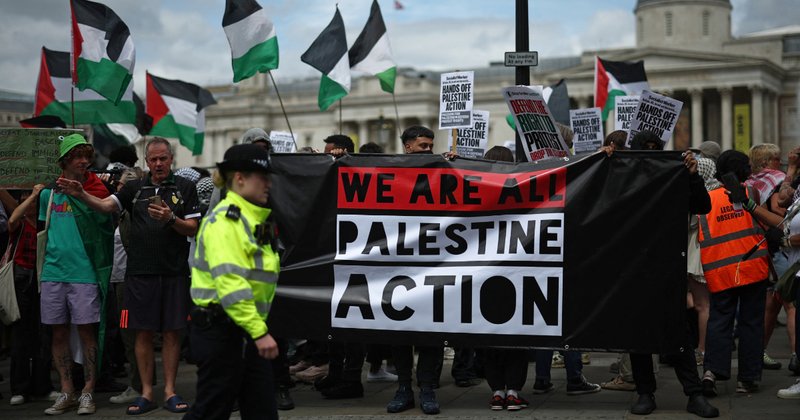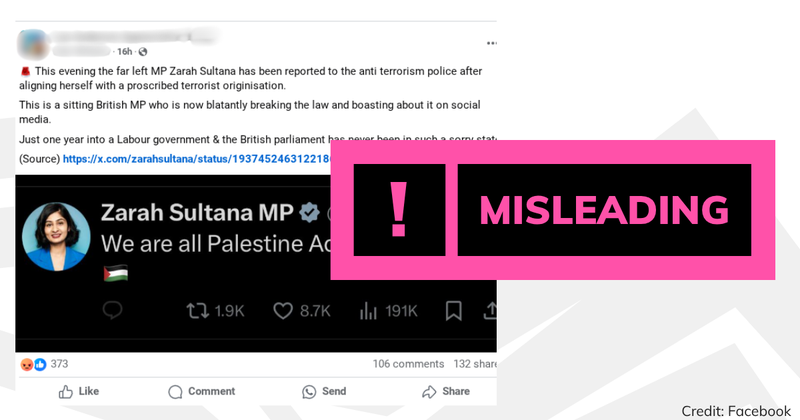When is Palestine Action set to be banned from?

We took a stand for good information.
As detailed in our fact check, the Independent and ITV News corrected their content after we got in touch.
On Monday 23 June the home secretary Yvette Cooper said she had decided to ban Palestine Action under anti-terrorism laws, days after the group said its activists had broken into RAF Brize Norton in Oxfordshire and spray-painted two military planes with red paint.
Contrary to some claims on social media, however, at the time of writing on Thursday 26 June this ban hadn’t yet come into effect. A draft proscription order will be laid in parliament on Monday 30 June, and if passed, this would then make it illegal to “be a member of, or invite support for, Palestine Action”.
The home secretary said Palestine Action’s attack on Brize Norton was “disgraceful” and the “latest in a long history of unacceptable criminal damage” committed by the group. However, she clarified that “this decision is specific to Palestine Action and does not affect lawful protest groups and other organisations campaigning on issues around Palestine or the Middle East”.
Palestine Action reportedly called the government's action “unhinged” and former Scottish First Minister Humza Yousaf said plans to ban the group were a “shameful abuse of anti-terror legislation”.
Join 72,953 people who trust us to check the facts
Sign up to get weekly updates on politics, immigration, health and more.
Subscribe to weekly email newsletters from Full Fact for updates on politics, immigration, health and more. Our fact checks are free to read but not to produce, so you will also get occasional emails about fundraising and other ways you can help. You can unsubscribe at any time. For more information about how we use your data see our Privacy Policy.
What is a proscribed group?
The government can proscribe organisations that it considers engage in or promote terrorism. Once an organisation is proscribed, it becomes a criminal offence to belong to it or to support it.
If passed, the ban on Palestine Action would make it a criminal offence to belong to or invite support for the group, punishable by up to 14 years in prison and/or a fine.
The maximum penalty for a slightly different offence, which includes wearing an item of clothing or carrying or displaying an article “in such a way or in such circumstances as to arouse reasonable suspicion that he is a member or supporter of a proscribed organisation”, is six months in prison and/or a fine not exceeding £5,000.
Social media claims about Zarah Sultana MP
We’ve seen a number of claims on social media this week suggesting that Palestine Action has already been proscribed, and some posts have linked this to a comment from the independent MP for Coventry South, Zarah Sultana.
On 24 June, Ms Sultana posted on X (formerly Twitter): “We are all Palestine Action.”
Some Facebook users have suggested this showed Ms Sultana aligning herself with “a proscribed terrorist group” or organisation.

However, when these Facebook posts were published, Palestine Action had not yet been banned as the proscription order will not be laid in parliament until 30 June—so Ms Sultana’s post did not refer to a proscribed terrorist group or organisation at the time it was written.
When we asked the Home Office about Ms Sultana’s statement, it referred us to the ministerial statement on Palestine Action which makes it clear a draft proscription order will have to go through the parliamentary process before the group becomes proscribed, and therefore illegal to be a member or supporter of.
The government’s list of ‘Proscribed terrorist groups or organisations’ also did not include Palestine Action as of Thursday 26 June.
The UK’s Independent Reviewer of Terrorism Legislation (IRTL) Jonathan Hall KC, who scrutinises and reports on terrorism legislation, told Full Fact that “the proscription does not operate retrospectively so conduct done before proscription cannot be an offence”.
He added: “That recognises a fundamental principle of criminal law, that people cannot be punished for conduct that is not yet made a crime.”
A former IRTL, Sir Max Hill KC, also told us “the Terrorism Act 2000 provisions in relation to supporting or belonging to a terrorist group (section 11 TA 2000) would not apply unless and until that group is formally proscribed”.
We have approached Ms Sultana for comment.
How long might it take to proscribe Palestine Action?
Adding an organisation to the proscribed list is subject to the affirmative procedure and therefore requires the approval of both Houses of Parliament.
The draft proscription order for Palestine Action will be laid on 30 June. If agreed by Parliament, the order is likely to come into effect a few days later, as was the case with the proscription of Terrorgram and Hizb ut-Tahrir last year.
Reporting on the upcoming ban
Although as we’ve explained at the time of writing Palestine Action has not yet been proscribed as a terrorist group, some media reports have appeared to suggest it has already been banned in their headlines, which may have added to the confusion on social media.
For example, an article published by Politico on 23 June was headlined “UK bans Palestine Action group after sabotage of military jets”, and said in the standfirst that “Home Secretary Yvette Cooper made membership of Palestine Action illegal with up to 14 years in prison”. The article itself did make clear that Yvette Cooper had said the group “would be proscribed under an order placed before parliament on June 30”, however.
We have contacted Politico for comment and will update this fact check if we receive a response.
Similarly, an ITV News segment uploaded to YouTube on 23 June was captioned “Palestine Action proscribed as terror group after RAF planes vandalised”. Although the report itself clearly says the group “will be banned”, this was not made clear in the video’s title or description, which claimed the group “has been proscribed”. ITV News has since changed the description under the video to “set to be proscribed”.
Several pieces published on the Independent’s website also included headlines appearing to suggest the group had been banned. After Full Fact got in touch, these were changed to clarify that the government is moving to ban the group. We’re grateful to the Independent and ITV News for their swift corrections.
As we have written before, not everybody reads an article in its entirety—and we often see stories shared on social media on the basis of their headline alone. We believe the public deserves good information, and that every article should be accurate and give all necessary context from beginning to end.
This article is part of our work fact checking potentially false pictures, videos and stories on Facebook. You can read more about this—and find out how to report Facebook content—here. For the purposes of that scheme, we’ve rated this claim as partly false because Palestine Action has not yet been proscribed as a terror group at the time of writing, or at the time these claims were made, though the government has announced plans to proscribe the group.